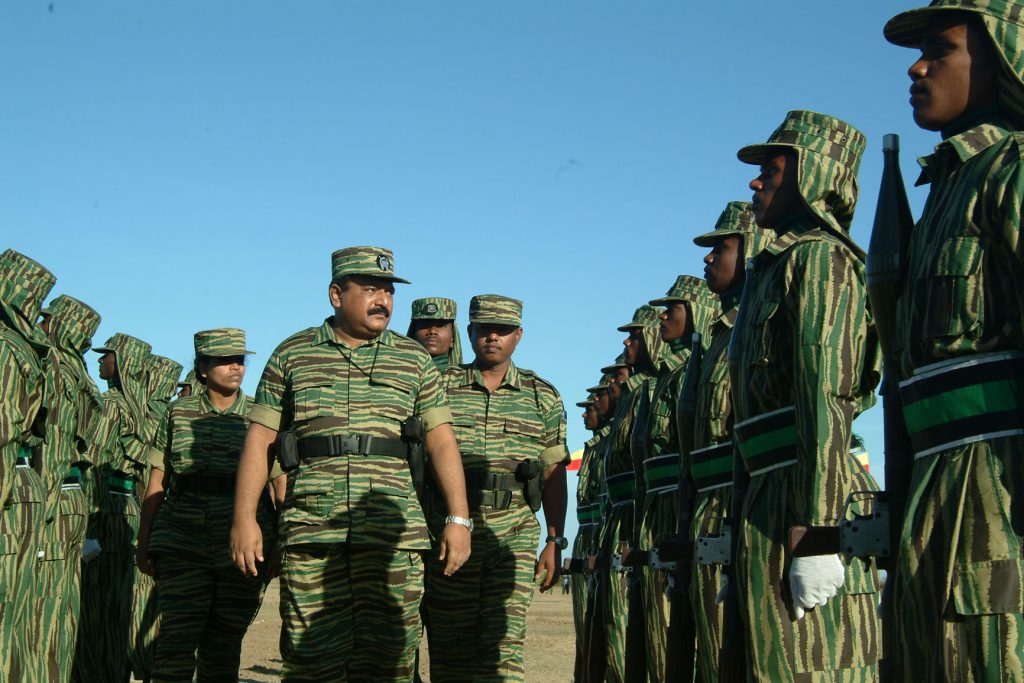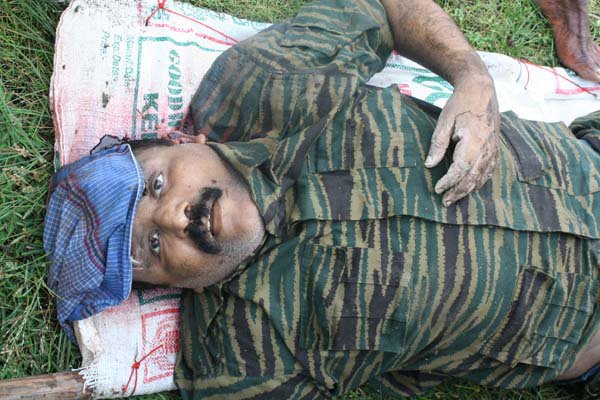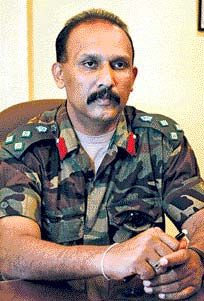Colombo, September 6 (NIA): Though the Liberation Tigers of Tamil Eelam (LTTE) have been militarily defeated, their ideology of Tamil separatism is still alive and is represented by the Tamil National Alliance (TNA), the pre-eminent Tamil political party today, says Maj.Gen.Kamal Gunaratne , who played a key role in the decimation of the LTTE in Eelam War IV in 2009.
“If a situation is created, the LTTE will make a comeback because the LTTE ideology is still alive. I don’t think that the Tamil political leaders will be satisfied with judicial, land and police powers, as the agenda of the Tamil National Alliance is Eelam and nothing else.,” Gen.Gunaratne told Shanika Sriyananda of Daily FT in an interview ahead of the release of his book Road to Nandikadal.
“If the situations are not handled properly, the LTTE can make a comeback as over 12,400 ex-combatants are living in society. Though they have undergone a comprehensive rehabilitation program, that doesn’t mean that they are 100 percent transformed into civilians,” he added.
Seeing the demand for devolution of power to a Tamil majority province as being as a separatist one the General said: “We talk about reconciliation, but listen to those who ask for land powers, devolution of powers, police and judicial powers and demand the removal of the Director of the Kilinochchi Hospital as he is a Sinhalese and to appoint a Tamil official. Just because we sang the National Anthem in Tamil, reconciliation doesn’t take place. The Government should be alarmed by the latest developments, which disturb peace, taking place in the north. The political leadership needs to take them as eye-openers and look at from a wider angle.”
The now retired General ,who led the 53 Division during the war gave the reasons for the defeats of the Sri Lankan army prior to Eelam War IV, how it changed comprehensively to be more than a match for the LTTE and why the LTTE failed eventually.

Hats Off To Prabhakaran
Though he condemns the slain LTTE chief Velupillai Prabhakaran as a ruthless terrorist, General Gunaratne has great admiration for is abilities.
“He may have been uneducated but he maintained strict discipline among himself and also within the outfit. He is the man who showed the art of suicide bombing. Before Al Qaeda’s first suicide bomber, Prabhakaran had over 200 suicide bombers in the LTTE. Most of the suicide cadres were females and were ready to sacrifice their lives at the command of their leader. There is no evidence to show that he abused those female cadres in the LTTE.”
“ He was a loving family man. The SLA recovered over 10,000 photographs of Prabhakaran, his family and LTTE functions but we never found a picture of Prabhakaran with a glass of alcohol. He was a disciplined leader and he maintained a law deadlier than Sharia law. If you steal, you lose your hand under Sharia law, but under Prabhakaran’s law you lose your life. Although he was a Hindu, he never believed in God. Once he said that God was there for the powerful countries. He was a different kind of a man and he had some good characteristics for someone to learn.”
“He was a firm decision maker. Whether the decision was right or wrong, he didn’t care and once a decision was taken, then it was implemented. Killing Indian Premier Rajiv Gandhi was among the most unwise decisions he had ever made. By killing Gandhi, he knew that India in its entirety and the world would come against him but still he wanted to take revenge from India for deploying the IPKF in Sri Lanka to crush the LTTE. So he killed him because he was ruthless. He had lots of patience and he was not hurry in his missions and waited for the right moment to strike.”

LTTE Cadres and Commanders Fought Well
Gen.Gunaratne gave full marks to the commanders and cadres of the LTTE.
“Prabhakaran was a ruthless man and his leadership until the last minute of the battle was excellent. The other leaders like Banu, Ratnam Master and Soosai also had an excellent command. Due to Soosai’s command during the last few days, nobody wanted to turn back. Their commandos performed well under the command of these leaders.”
“From reconnaissance cadres and explosive experts to suicide cadres and its artillery teams, including artillery observers, all were highly-capable cadres,” the General said.
The LTTE suffered because it lost the leadership of Balraj, who died of a heart attack. He was one of the “best commanders” of the LTTE. It lost Karuna Amman, who was also one of the “best fighting commanders”. The next best commander was Theepan, who fought till the fall of Puthukkudiyiruppu.
“The top leadership was strong and fought till the last few hours of the final battle,” Gen.Gunaratne recalled.
Why LTTE Failed Finally
On the reasons why the LTTE lost finally, the General said the main reason was that they didn’t fight with the same Sri Lanka army they had fought before 2005.
“In the last battle they had to fight with an Army which was more professional and had a different attitude. Commanders at all levels were well-experienced. As I said before, we identified our weaknesses and rectified them. We identified the plus points of the LTTE and we learnt from them. Those days we wanted to fight like a conventional force but in Eelam War IV, the Special Forces and the Commandos had shaped the battle field by deploying their small teams. This was what the LTTE did those days and they put lots of fear into our rear. This time we put lots of fear into their rear.”
The LTTE leader’s new found passion for fighting a conventional war instead of a guerilla war, led to his doom. This transition proved to be good for the Sri Lanka army and bad for the LTTE.
“The outfit lost its capabilities as Prabhakaran wanted to make the outfit a conventional army, which had a high recruitment drive with limited training for recruits. The other reason was the SLA was powerful in attacking from multiple fronts. Therefore, the LTTE with shrinking manpower couldn’t sustain the fight,” the General explained.
The other reason why the LTTE failed was that it used the common man as a human shield. With that it lost the people’s support, so vital for the success of a military operation, Gen.Gunaratne said.




























































